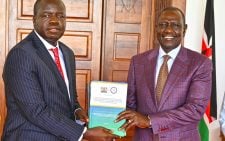‘Elephant Man’ embarks on journey to protect species

Kenya’s elephant conservation champion Justus Nyamu yesterday embarked on his 17th walk from Nairobi to Addis Ababa, Ethiopia aimed to raise public awareness on poaching, habitat loss, and human-wildlife conflict.
The 2,900 km distance will take Nyamu approximately 90 days to complete, an adventure that will see him hold community meetings, school visits, and public fora to discuss the importance of elephant conservation and sustainable practices that can help protect them.
“This walk is not just about covering distance; it’s about connecting with people and inspiring them to take action,” Nyamu said.
“Elephants are a keystone species, and their conservation is integral to the health of our ecosystems and the well-being of local communities.”
The founder of the Elephant Neighbors Center and his entourage were flagged off at the Kenya Wildlife Service headquarters by KWS’s Director of Wildlife and Community Service Charles Musyoki.
Nyamu noted that the African elephant population is declining at an alarming rate and would soon be an extinct species due to poaching over their ivory.
He said that the ‘Ivory Belongs to Elephants’ campaign is both a call to action and an educational endeavour, designed to engage communities, policymakers, and international stakeholders on measures that would best avert the abuse of wildlife by humans.
Some of the proposals that he will be fronting during his walk include advocating for stronger anti-poaching laws, supporting community-based conservation initiatives, and promoting coexistence between humans and wildlife.
“The walk will traverse diverse landscapes, including national parks and reserves, allowing me to document and share firsthand accounts of the challenges and successes in elephant conservation,” he said. Nyamu said that about 70 per cent of Kenyan wildlife live outside the protected areas which has fueled human-wildlife conflicts over time.
As he heads north, he will make his first stopover between Ruiru and Juja to assess areas where hyenas have been attacking people before entering his home county of Murang’a where residents have been battling monkey invasion on their farms.
“Tomorrow (today) I’ll be dealing with the issues of hyenas in between Ruiru and Juja. I also know that Murang’a people are waiting for me because Velvet monkeys are everywhere. Our conversation with these people will help to open a dialogue revolving around, who came first. Is it the man or the wildlife? Who has the authority to take care of these animals?” he stated.
Noting that compensations that are paid out to victims of wildlife harm are not sustainable, Nyamu said that stakeholders must educate the public prone to wildlife attacks about their safety.
“Is awarding of conservation sustainable? Because if you compensate me today after losing my brother to wildlife, it’s not guaranteed that tomorrow I will not lose my sister. So that’s a discussion that we’ll be having which will be based on the recently launched national strategy of KWS that contains elaborate strategic objective on how to engage stakeholders on matters wildlife,” he said.
Nyamu added: “This time, we are actually doing the real thing, to educate the Kenyans. The moment we lose our wildlife; we’ll be the people to be asked many questions by the coming generations.”
The wild animals enthusiast said that human-wildlife conflict is very high because man has become so greedy and wants to enjoy all available space, without factoring in wildlife which is a key component of the ecosystem.
Additionally, Nyamu emphasized that countries must collaborate in order to protect cross-border species which are not confined to one country.
“Animals like elephants are cross-border species that require protection beyond the boundaries. Elephants within Kenya will not be safe until we get other countries on board. Thankfully, Kenya sits as a chairperson for the Lusaka Agreement, which looks into the collective issues of the cross-border species,” he said.
On his part, Musyoki assured Nyamu that KWS will accord him all the required support as he snakes through 10 counties before entering Ethiopia.
“This is a very important course, because if we do not drum up support for conservation and if we do not create awareness amongst the public about the plight of not just elephants, but also other wildlife, very soon you will find that we don’t have these animals in our field,” Musyoki said.
He went on: “Initiatives like what Nyamu and others have been carrying out are very important for us (KWS), that we are able then to reach out to as many people as we can about the plight that is facing elephants, the plight that is facing many other wild animals in this country and across the globe.”
Nyamu has previously completed 18 similar walks across other countries including Tanzania, Uganda, DRC Congo, Rwanda, Botswana, the United Kingdom and the United States.










